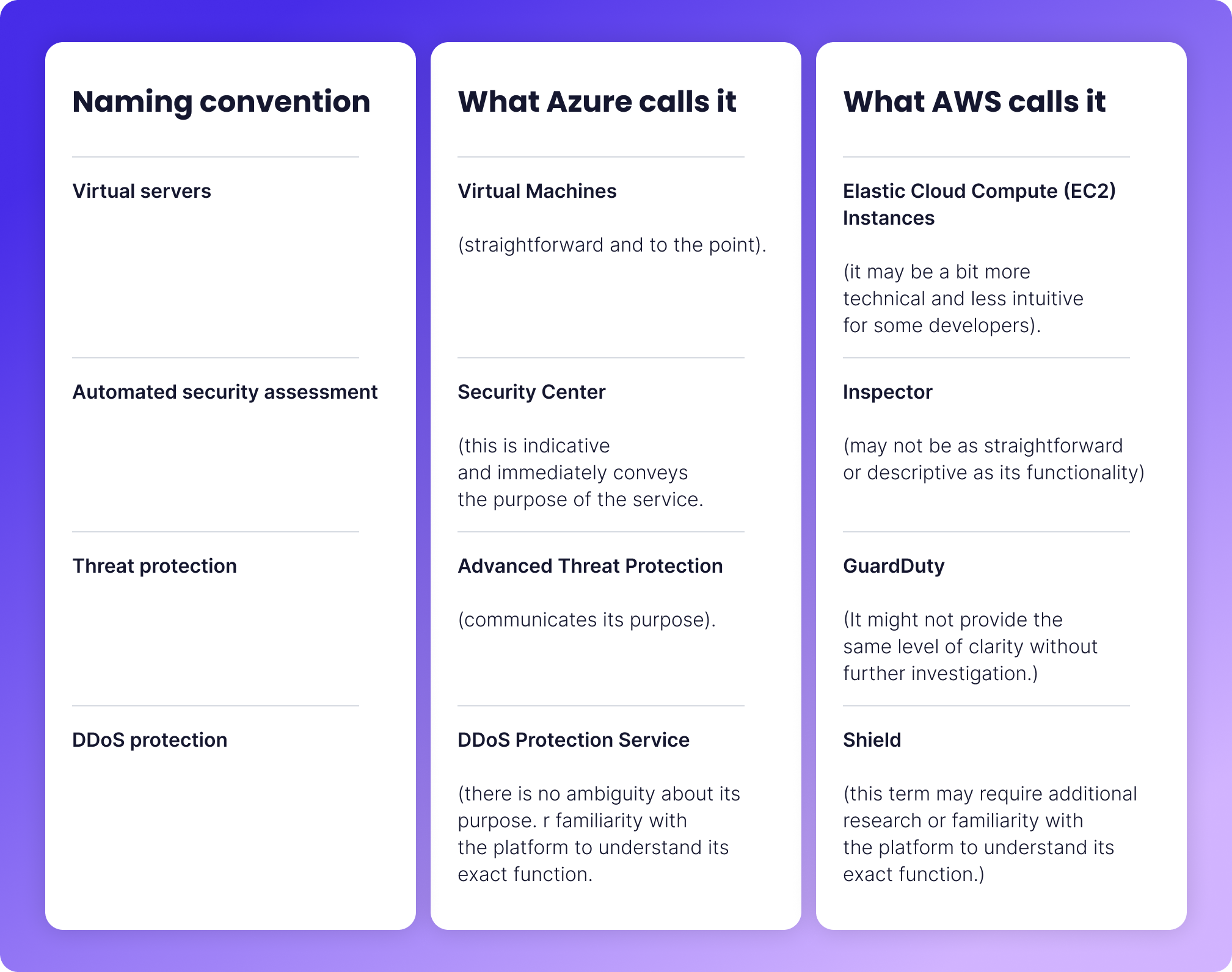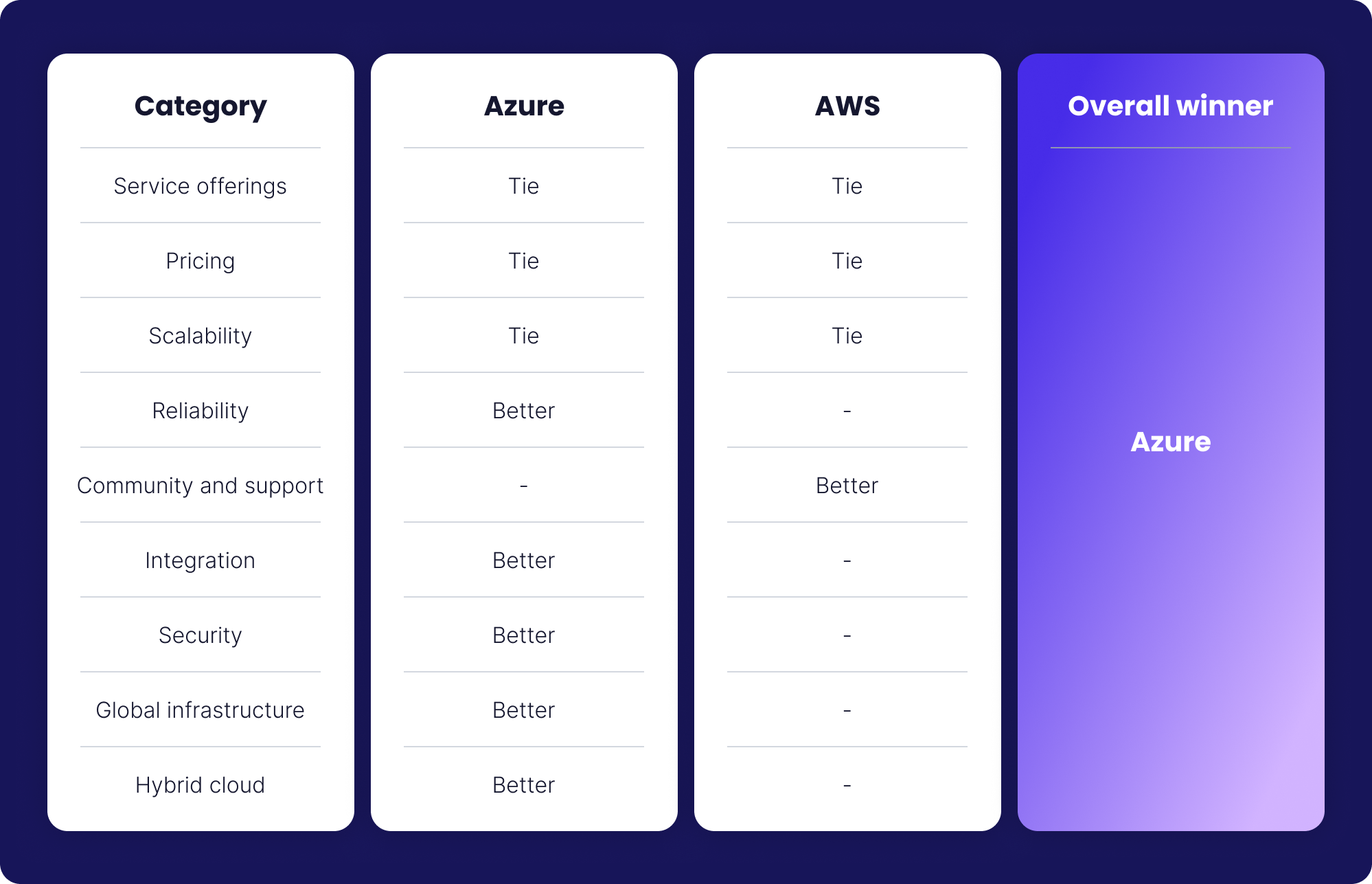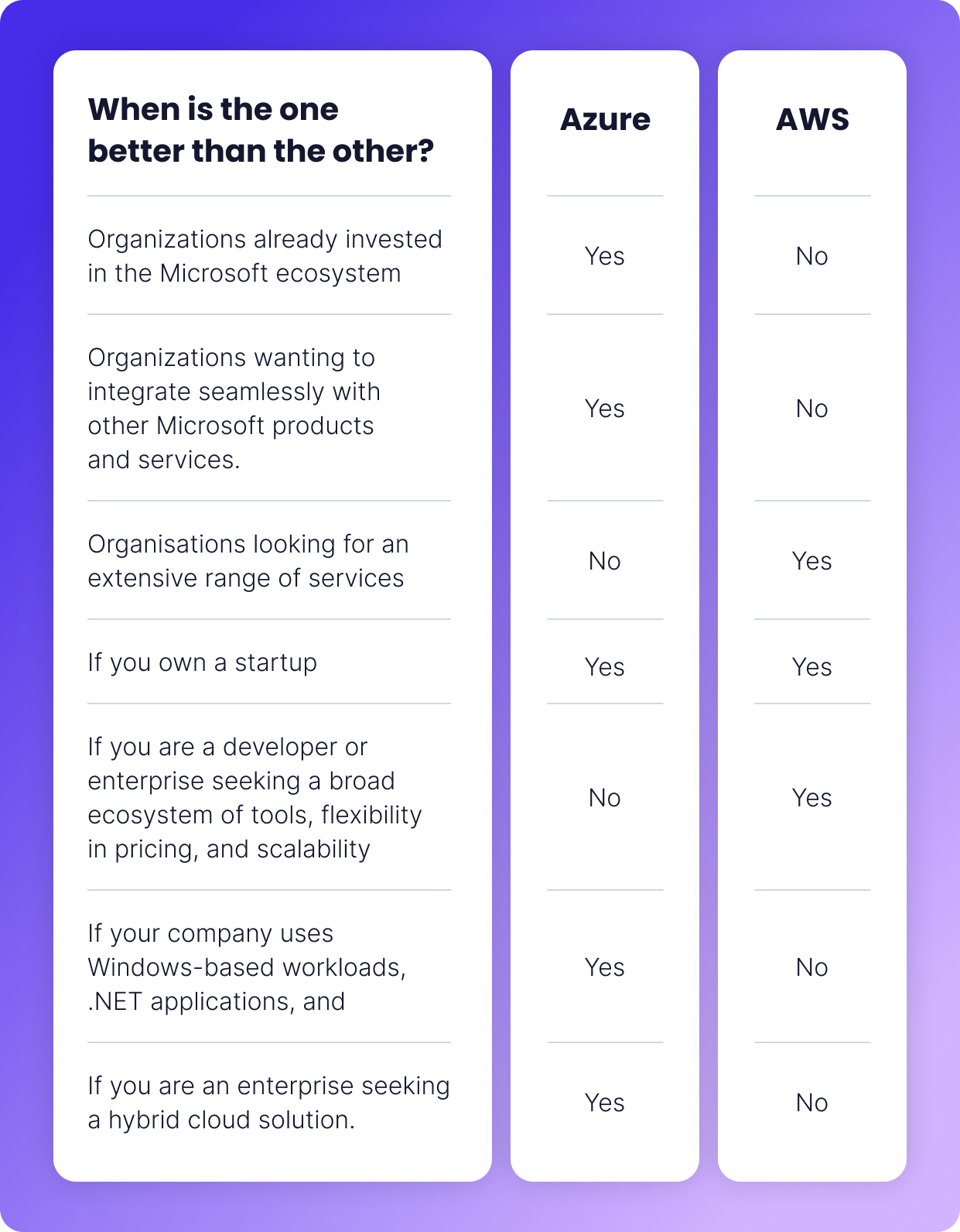Cloud computing has become integral to modern business operations, enabling organizations to scale their IT resources on demand, reduce costs, and increase agility.
When choosing a cloud platform for your business, the two most prominent options are Microsoft Azure and Amazon Web Services (AWS). Both platforms offer a wide range of services and features, but there are some key differences that can make one a better choice than the other, depending on your specific needs and priorities.
1. Core services comparison
Azure and AWS offer vast services, including computing, storage, databases, machine learning, and more. AWS has a more extended history and a broader range of services, while Azure is catching up rapidly with innovative offerings. Despite this, for each service offering AWS has, Azure has its counterpart.
For example, AWS offers a diverse range of compute options, including EC2 instances, Lambda functions, and Elastic Beanstalk, which makes it easier to find the right solution for your specific workloads. On the other hand, Azure’s compute options include Azure Virtual Machine, Azure Functions, and Azure App Services. AWS also has a robust and feature-rich storage service, with options like S3, EFS, and Glacier catering to various storage needs. Azure’s File Storage is also split into multiple areas.
Depending on your specific requirements, one platform may have more comprehensive features than the other, or either platform could be the right choice.
Winner: Tie
2. Pricing and cost management
Both Azure and AWS offer pay-as-you-go pricing models, but AWS is generally considered more cost-effective for most use cases. Its more transparent and straightforward pricing model makes estimating and managing costs easier.
Additionally, AWS offers a wide range of cost optimization tools and services, such as AWS Cost Explorer, AWS Budgets, and AWS Cost Anomaly Detection, which can help you monitor and optimize your cloud spending.
Jacob Kalvo, Co-Founder and CEO at Live Proxies, says cost optimization in AWS deployments requires a comprehensive approach tailored to each project's specific requirements. He says when leveraging AWS's pay-as-you-go model, he focuses on rightsizing instances, implementing auto-scaling policies, and utilizing reserved instances or savings plans where applicable.
"I regularly analyze usage patterns, optimize storage solutions, and leverage cost monitoring tools like AWS Cost Explorer to identify opportunities for optimization and ensure cost efficiency across deployments."
Richard Morgan, Founder of the Catalyst Fund, says cost optimization is critical for AWS.
"I typically start by identifying and shutting down underutilized or idle resources to reduce unnecessary costs."
Winner: Azure (for Windows-based applications), AWS (for Linux-based workloads)
3. Scalability
Both Azure and AWS offer the ability to scale resources up or down based on demand. However, Azure's autoscaling capabilities are considered to be more user-friendly and intuitive. Azure also has a unique feature called Azure Functions, which enables developers to build serverless applications and scale them effortlessly based on triggers.
Cache Merrill, founder at Zibtek, discovered AWS and Azure to be particularly effective in scalability and flexibility in his business.
"We used AWS to deploy a large-scale web application for a healthcare client that needed to handle varying loads of user traffic, especially during peak hours. AWS's auto-scaling capabilities allowed us to manage the compute resources dynamically, ensuring optimal performance without overspending."
Cache added how they also leveraged Azure for a financial services client deeply embedded in the Microsoft ecosystem.
"We utilized Azure's seamless integration with Microsoft products like Office 365 and Active Directory. This integration facilitated a smooth migration of their on-premises applications to the cloud, enhancing operational flexibility and enabling better remote collaboration capabilities across global teams."
Both Azure and AWS excel in scalability, allowing users to scale resources up or down based on demand easily. AWS's Auto Scaling feature is well-established and offers granular control over scaling policies. Azure provides similar capabilities with its Autoscale feature, ensuring that applications can handle fluctuations in workload seamlessly.
Winner: Tie
4. Reliability
Both Azure and AWS have highly reliable infrastructures and impressive uptime. However, Azure has the advantage of being built on Microsoft's vast network of data centers, ensuring redundancy and fault tolerance. Azure's Service Level Agreements (SLAs) also offer stronger guarantees for uptime and availability than AWS's.
Matt Little, Director & Entrepreneur at Festoon House, says the Power Platform bridges Azure and other Microsoft services.
"Imagine building automated workflows that connect your on-premise data with services like Dynamics 365 or Power BI. It's a low-code/no-code environment, so even folks without hardcore programming skills can leverage its power. We've automated many repetitive tasks with Power Automate, freeing us up for more strategic work."
Winner: Azure
5. Community and support
AWS has a larger and more established user base, making it easier to find resources and guidance online. AWS also offers excellent documentation and a robust support system. While Azure's community is growing rapidly, it may still need to catch up to AWS in terms of community size and third-party integrations.
Azure has rapidly grown its community and ecosystem, leveraging Microsoft's extensive network of partners and developers. Depending on your specific requirements and preferences, one platform may offer a more suitable community and ecosystem.
Winner: AWS
6. Integration
One of Azure's key strengths lies in its seamless integration with Microsoft's suite of tools and services. If your project heavily relies on Microsoft technologies such as Active Directory and Office 365, Azure provides a more cohesive and streamlined experience. AWS, on the other hand, offers a broader range of integrations with third-party tools and services.
Kevin Huffman, seasoned day trader and owner of Kriminil Trading, says that well-integrated technology can make a real difference if your company moves quickly.
"When our boutique day-trading firm began using Microsoft Azure more than five years ago, our experience with other Microsoft products meant that the integration made all the difference."
For Kevin's company, the benefit of Azure's service being tightly integrated with multiple tools and productivity apps known by their traders, such as Excel and Power BI, was exactly what they needed. It allowed them to feed real-time market data directly into Excel spreadsheets, which resulted in their traders executing trades more quickly.
"Power BI can generate various dashboards to illustrate market trends so that trading opportunities can be identified and executed in near real-time. Such seamless integration reduces the time needed to manually extract and manipulate data, which helps us avoid making mistakes. Since our world is quite dynamic, we have to be quick."
Azure seamlessly integrates with other Microsoft products and services, making it an attractive choice for organizations already invested in the Microsoft ecosystem. AWS, on the other hand, provides extensive support for third-party integrations and open-source technologies.
Winner: Azure (for Microsoft-centric environments), AWS (for third-party integrations)
7. Security
Azure and AWS prioritize the protection of customer data and adherence to industry standards. They offer comprehensive features and certifications to ensure data security, privacy, and regulatory compliance. However, Azure is often regarded as the more secure option due to its strong enterprise security features, such as Azure Security Center and Azure Active Directory.
Matt believes Azure Active Directory (Azure AD) is a powerful tool for managing user access and permissions across all Microsoft products and Azure services.
"It simplifies security and streamlines administration. I can easily set up granular access controls, ensuring only the right people have access to the right data, whether on-premises or in the cloud."
Azure also boasts a secure development lifecycle and complies with various industry regulations.
Winner: Azure
8. Global infrastructure
While Azure and AWS offer excellent performance, AWS is known for its industry-leading infrastructure and faster response times. Azure and AWS have a vast global infrastructure, ensuring your applications can be hosted and accessed from various geographic regions.
However, AWS has a slight edge regarding the number of data centers and regions available worldwide, providing more options for geo-redundancy and disaster recovery scenarios.
Both Azure and AWS have a global infrastructure with data centers in multiple regions worldwide. AWS has a larger global footprint with more regions and availability zones, providing better redundancy and availability.
However, Azure has rapidly expanded its global infrastructure and offers more regions in some areas, like Europe and the Middle East. Overall, AWS is better in this category due to its more extensive global infrastructure and longer track record of regional availability.
Winner: AWS
9. Hybrid Cloud
If your project requires a hybrid cloud setup, where you need to integrate on-premises infrastructure with the cloud seamlessly, Azure has a clear advantage. Azure's strong integration with on-premises Microsoft technologies, such as Azure Stack, allows for a consistent hybrid cloud experience. AWS also provides hybrid cloud solutions but may require more effort to set up and manage.
Based on the nature of their company, Matt says his business model has benefited from this.
"I'm not saying Azure is the only integration hero out there. AWS has its own set of tools, but for a Microsoft shop like ours, Azure's tight integration feels like a natural extension of what we already use and know. It simplifies development, cuts down on administrative headaches, and lets us focus on what truly matters – building great applications and solutions."
Winner: Azure
A developer's perspective on naming conventions
Various factors must be considered in the debate between Azure and AWS. From a developer's perspective, one crucial aspect is the naming conventions utilized by each platform. Azure, in particular, excels in providing clear and intuitive names for its products, services, and settings, making it easier for developers to navigate and understand the platform.
Let's take a look at some examples in which Azure's naming conventions may outshine AWS:

Berkin Sili, Client Engineering Manager at Proxify, says these naming conventions become crucial for the developers working on them.
"From a DevOps Engineer's perspective, when they are making custom configurations for their clients, or they are going to set up a new service, Azure's naming conventions make it easier for engineers to know where they should be looking for."
Azure's clear and straightforward names make it easier for engineers to locate the services they need, whether they're making custom configurations for clients or setting up new services.
Berkin adds,
"Imagine trying to set up DDoS protection on AWS and coming across two services, 'GuardDuty' and 'Shield' – the names alone do not provide much guidance. However, on Azure, one can be confident that "DDoS Protection Service" is the appropriate choice."
Overview and summary

Azure and AWS offer robust cloud platforms with many services and features. With its seamless integration with Microsoft tools and technologies, Azure is a better fit for projects that heavily rely on the Microsoft ecosystem. On the other hand, AWS excels in community support, performance, and global infrastructure, making it a viable choice for projects requiring scalability and global availability.
Ultimately, the choice between Azure and AWS depends on your project's specific requirements and priorities. To make an informed decision, consider factors such as pricing, service offerings, scalability, reliability, community support, integration, security, performance, global infrastructure, and hybrid cloud needs.
Choose wisely, and leverage the power of the cloud to build and scale your applications efficiently!
Note: The winners in each category are subjective and may vary depending on specific use cases and project requirements. It is recommended that both platforms be thoroughly evaluated before making a decision.
In conclusion, Azure and AWS are both powerful and feature-rich cloud platforms, each with its own strengths and areas where it excels. AWS emerges as the better choice for most general-purpose workloads thanks to its more granular pricing, broader range of compute and storage options, and more extensive AI/ML services. It's also the preferred platform for serverless applications, containerization, and projects requiring robust global infrastructure and content delivery capabilities.
However, Azure shines in security, compliance, and governance, making it a compelling choice for enterprises with stringent regulatory requirements or those seeking comprehensive security and policy management tools. Thanks to its more integrated solutions like Azure Stack and Azure Arc, it's also the better option for organizations adopting a hybrid or multi-cloud strategy.
For Jacob, AWS's or Azure's unparalleled scalability and flexibility set their range of services apart from those of other cloud providers.
"AWS offers a vast array of services spanning compute, storage, networking, databases, machine learning, and more, coupled with global infrastructure, enabling clients to scale resources seamlessly and rapidly adapt to evolving demands. Similarly, Azure provides a comprehensive suite of services integrated with Microsoft's ecosystem, offering hybrid capabilities and robust developer tools, facilitating seamless migration and innovation at scale for our clients at Live Proxies."
Ultimately, the choice between Azure and AWS will depend on the specific requirements of your projects, your organization's existing skills and investments, and your long-term cloud strategy. For many organizations, a multi-cloud approach leveraging the strengths of both platforms may be the optimal solution. Regardless of your choice, both Azure and AWS offer powerful and scalable cloud platforms that can drive innovation and digital transformation across a wide range of industries and use cases.

 English
English








